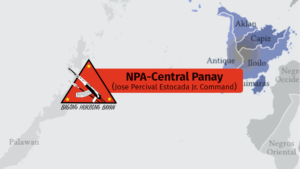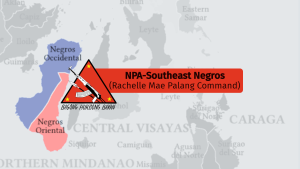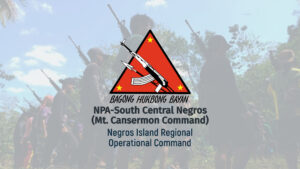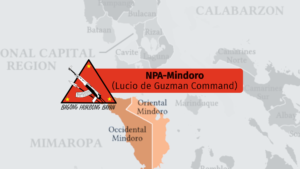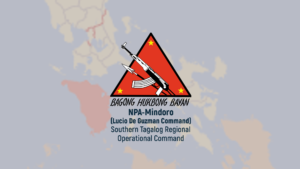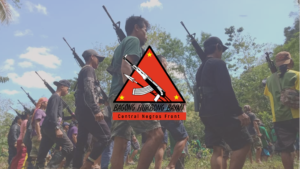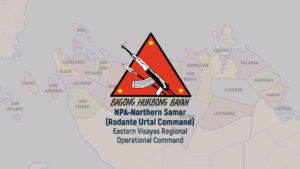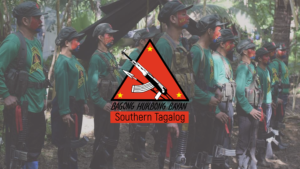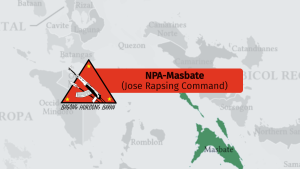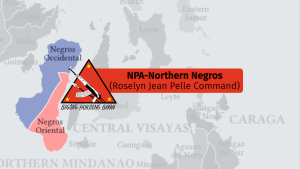Right to revolt
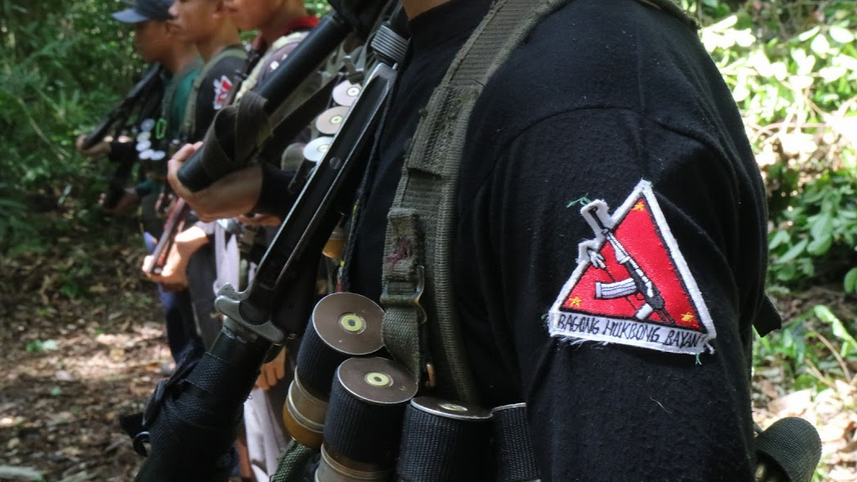
The surge and continuous rise of state-sponsored human rights violations (HRVs) in the countryside – combined with the current massive and violent crackdown on the legal democratic movement, progressive and other democratic sectors, and the renewed intensiveness of the virulent anti-drug campaign nationwide – make the Duterte regime the worst regime for human rights in the country. Never under any other president of the Philippine Republic had there been a track record of a murder of 30,000 drug suspects and at least 1,000 residents of Marawi City, and, tens of thousands of victims of HRVs, and still counting, in an all-out war against the revolutionary movement and the Filipino people in just a span of four years.
Based from initial and partial reports we received from the field nationwide, at least 30,254 had fallen victim to HRVs by all armed apparatus of the state from January to October 2020 alone. This figure is 95 percent higher than the total number of HRV victims reported in 2019 (28,828), exclusive of the cumulative number of 30,000 dead victims of the regime’s “drug war” since Duterte assumed office.
Majority of the 30,254 victims of state-sponsored HRVs come from the peasantry (27,509), most of whom are national minorities (20,499) – the highest numbers recorded so far under Duterte’s term. These had increased dramatically this year as a result of the Duterte regime’s intensified militarization and suppression campaigns in the countryside, affecting the country’s biggest population. Aside from widespread and sustained military operations, there are presently thousands of military detachments nationwide that are the main sources of rampant state-sponsored HRVs in the countryside.
In a semi-colonial and semi-feudal system like ours, the frequency and gravity of state-sponsored HRVs are directly related to the effects of the exploitative vested interests of imperialists and the local ruling classes, and the intensity and spread of suppression campaigns and operations of the reactionary government in reaction to the level of resistance of the legal and revolutionary movement of the people against the current oppressive and exploitative ruling system.
HRVs an offshoot of Duterte’s unjust war
Duterte’s war of suppression, resulting in unprecedented HRVs in the countryside, is not a just war. It is a cruel anti-people war that violates the inherent socio-political and economic rights of the people. It is a war that inevitably results in HRVs with impunity in the service of the exploiting classes of big compradors, despotic landlords, foreign corporations and businesses and imperialist interests. Military detachments and paramilitary patrol bases are conveniently and strategically placed to protect big mining corporations and plantations at the expense of ancestral domains, in denial of the people’s right to genuine land reform and in utter disregard of the destructive effects on the environment.
State-sponsored HRVs are being committed with impunity where focused, sustained and clearing military operations are being brutally launched in defense of haciendas, giant plantations, mining companies and other multinational corporations.
This is the regime’s underlying motive in suppression campaigns such as Oplan Sauron that massacred scores of peasants and human rights defenders in Negros, home to the country’s biggest sugar cane plantations and haciendas. Likewise, this is also the main reason for the overkill increase in troop deployment, focused military operations and intensive and sustained military campaigns in Mindanao, particularly in eastern Mindanao, host to agri-businesses such as DOLE-Philippines, Del Monte Philippines, Consunji IFMA and agri-business, and the palm oil plantations in both Lanao and Maguindanao, among others. Also located in Mindanao is the biggest number of mining companies in the CARAGA region; and, also mining companies such as the Tampacan Gold Project in North Cotabato, North Davao Mining and the Diwawal gold mining both in the province of Davao de Oro, as well as the oil and mineral-rich natural resources in Liguasan Marsh located in the boundaries of Maguindanao and Cotabato provinces . Moreover, there is increased militarization and fascist attacks in Southern Tagalog, where there is a concentration of economic processing zones and multinational industrial enclaves.
More military presence, more abuses
The more than 20 percent spike in troop strength and unprecedented level of upgrade in war technology and armaments of the Armed Forces of the Philippines and Philippine National Police within Duterte’s term, relentless heightened FMOs and the breadth of the so-called “counter-insurgency” campaign of the regime’s National Task Force to End Local Armed Conflict (NTF-ELCAC) are the top causes of the sudden surge in incidents of state-sponsored HRVs in the whole country.
These state-sponsored abuses are more prevalent in Mindanao, where 60 percent (86 battalions) of the AFP’s total strength is deployed against both the New People’s Army and the other armed Moro resistance groups. In the Southern Tagalog and Bicol regions, state-sponsored HRVs are also relatively high. Of the 27 percent (38 battalions) of the total troop strength of the AFP in Luzon, 13 battalions and 8 battalions are deployed in Southern Luzon and Bicol, respectively. State-sponsored HRVs are also rampant in both the Eastern Visayas and Negros Island regions. Of the 13 percent (19 battalions) of the total AFP troops in Visayas, 11 battalions are deployed in Eastern Visayas and four in Negros Island. These figures do not include police and paramilitary troop deployment who are also liable for numerous HRVs.
Furthermore, the establishment of thousands of AFP and PNP detachments particularly reflects the very dismal human rights situation in the countryside. In NPA areas in Mindanao alone, there are at least 1,003 military detachments mostly occupying barangay halls, schools and residences, thus, endangering the lives of peasant and lumad communities and in violation of international protocols of war. Increased troop deployment has also disrupted the lives and livelihoods of the people through the imposition of resource and population control such as curfew hours, the restriction of farming hours, the free flow of food supply and other material needs of the residents, installation of disruptive checkpoints and other such restrictive policies reminiscent of the infamous and extremely inhumane US imperialist hamletting program in Vietnam.
Attacks on intensified people’s resistance
Fascism begets resistance. Worsened repression and exploitation have given rise to all forms of intensified people’s resistance in the countryside, armed and unarmed, in defense of human rights and democratic interests. In reaction, the Duterte regime has brutally unleashed more brazen and barbaric attacks against the resisting peasant masses.
Consequently, thirty-seven (37) out of the 68 total number of victims of extrajudicial political killings in the first 10 months of 2020 were farmers. Likewise, nine (9) out of the 16 victims of torture; 2,743 out of the 3,320 victims of threat, harassment and intimidation; 24 of the 32 victims of physical assault and/or injury; and, 69 of the 81 victims of illegal search and seizure come from the peasant sector.
Meanwhile, 20 out of the 35 victims of frustrated killings; 18,496 of 20,848 victims of forcible evacuation and displacement; 75 of 94 victims of destruction of property; and, all of the 1,200 victims of food and economic blockade due to military hamletting come from the national minority sector. The number of victims of illegal arrests and detention tripled, from 271 in 2019 to 692 in January to October of this year. Of these, 189 are farmers while 165 are national minorities. These data does not yet include HRVs in Moro areas.
Most of these incidents occurred in target areas of FMOs for this year where the people’s army is persevering and the people’s resistance is gaining strength. Among these are all regions under the AFP Eastern Mindanao Command (North Central Mindanao, Southern Mindanao Region, North Eastern Mindanao Region and Far Southern Mindanao Region), Southern Tagalog and the Bicol region in Luzon, and Eastern Visayas and Negros Island in the Visayas region. Some 984 barangays, 366 towns and 62 provinces nationwide are presently affected by TRIAD operations of the military, now with the use of the entire government machinery through the NTF-ELCAC. The most brutal attacks are characterized by aerial bombings, artillery shelling and indiscriminate strafing in the military’s FMO areas, and widespread extra-judicial killings.
In the past months, the AFP had launched aerial bombardments that had endangered or killed civilians, traumatized communities and destroyed farmlands and the environment in Quezon, Bukidnon, Davao del Norte, Negros, Northern Samar, Agusan del Sur, Surigao del Sur and other provinces in the course of its combat operations against the NPA. Military spokesmen euphemistically refer to these attacks as “aerial support”, falsely reporting such incidents as “legitimate encounters” between the NPA and AFP ground troops.
Also, there is now a consistent pattern of “bringing no prisoner alive” in relation to hors de combat, as were the fates of Alfredo “Ka Bendoy” Merilos of Bicol, NDFP Consultant Randy Malayao of Cagayan Valley, Julius “Ka Nars” Giron of Cordillera, Eugenia Apostol and Agaton Topacio of Central Luzon, NDFP Consultant Randall Echanis, Dennis Rodenas of Southern Mindanao and NDFP Mindanao Spokesperson Alvin “Ka Joaquin Jacinto” Luque – all of whom were made to appear that they were armed and “nanlaban”. However, all were unarmed and had no means to defend themselves at the time of their tokhang-style assassination.
The regime’s spreading of fake news, lies and black propaganda to justify its red-tagging and vilification campaign against the revolutionary movement and legal democratic groups has also become more rabid this year. The most recent and glaring examples of these are the dubious “coming out” of fake whistle-blower Jeffrey Celis and the military’s malicious linking of the death of NPA medic Jevelyn, 22-year-old daughter of BAYAN MUNA Rep. Euphemia Cullamat, to her mother’s legal personality. Jevelyn’s decision to join the NPA, which should be totally independent and irrespective of her mother’s current position in government, is now being used to further vilify and implicate Rep. Cullamat and BAYAN MUNA in the regime’s red-tagging.
Meanwhile, there has also been no respite in the militarization and offensives by the AFP in Bangsamoro areas. Marawi remains a ghost town, with some 130,000 residents yet to return to their homes and reclaim their land and hard-earned properties. The Duterte regime, however, chose to prioritize the building of a P400-million military camp instead of homes, schools and other much-needed public facilities for the city’s rehabilitation.
Worst HRVs despite Covid-19 crisis
Incidentally, and unsurprisingly, the number of state-sponsored HRVs surged from March 2020 onwards, on the onset of military lockdowns in light of the pandemic – accounting for 289 of the 392 total sum of HRV incidents, affecting 23,661 victims. The Duterte regime has been using the Covid-19 crisis as a pretext to silence and attack the revolutionary movement, opposition groups and the general public.
In the countryside, villagers and townsfolk have expressed grave concern that the military may well be potential virus carriers and transmitters. Intensified militarization and deployment had brought in more troops roaming around their communities without face masks and protective gear and showing no regard for preventive measures such as social distancing and proper sanitation.
After employing authoritarian emergency powers in the guise of the Covid-19 crisis, these figures are still sure to increase with the enactment and implementation of a more brutal #Duterterrorism through the Anti-Terrorism Act. This had certainly emboldened and gave more license to the military and police to further attack peasants and national minorities with impunity. Also with the ATA, the Duterte regime is set to further repress and suppress the legal opposition, the youth and student movement, trade unions, the urban poor, teachers, the religious, professionals, human rights advocates and critical members of the media.
Right to revolt
In the face of the Duterte regime’s brutal HRVs and fascist anti-people attacks, the peasant masses and the people are now more than ever roused to take part in the revolutionary armed struggle and exercise their inherent right to take up arms against a tyrannical and exploitative regime.
In line with this, the NPA National Operational Command calls upon all units and commands to pay attention to the human rights of the peasant masses and the people. These rights include their socio-political and economic rights and general well-being.
The NPA must carry out more punitive tactical offensives nationwide against the most notorious units of the AFP and PNP and their paramilitaries. The most abusive and exploitative land-grabbers and imperialists and their local lackeys’ corporations must be punished and prevented from further harming the people’s interests.
Rampant HRVs, state fascism and the worsened culture of impunity in the whole country, especially in the countryside, are self-defeating. Duterte’s desperation to silence the opposition and suppress dissent and foolhardy desire to cling to power have driven more progressive and democratic sectors to rise up and revolt.
Today, as we commemorate International Human Rights Day, let us build the broadest unity to oust Duterte’s fascist regime, and, ultimately, overthrow the rotten system. These are the only guarantee for the Filipino people to uphold and protect their human rights. ###

